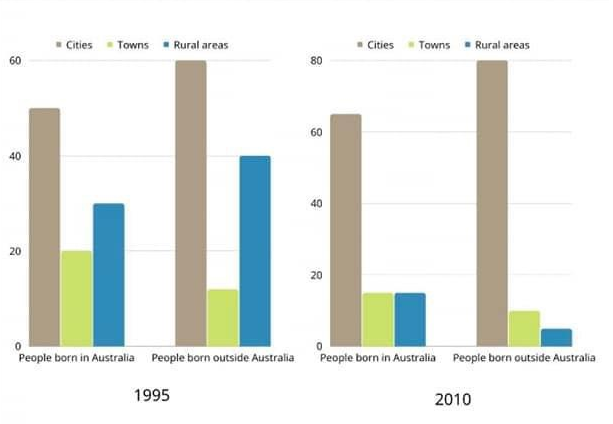[Arden A] Writing Practice Test 1224243
Task 1
You should spend about 20 minutes on this task.
The bar chart below describes some changes about the percentage of people were born in Australia and who were born outside Australia living in urban, rural and town between 1995 and 2010.
Summarise the information by selecting and reporting the main features and make comparisons where relevant.
You should write at least 150 words.

The bar charts above display changes in percentage of people who were born in Australia and outside of Australia living in urban, rural and town between 1995 and 2010 side by side.
Let's focus on some of the changes that have increased. The percentage of people born in Australia in cities in 1995 increased from approximately 50% to 65% in 2010. People who were born outside of Australia in cities in 1995 have a percentage at around 60%, but the number rose up to 80% in 2010.
Now let's look at where the number decreased. In 1995 the number of people who were born in Australia in towns decreased from 20% to around 15% in 2010. People who were born in rural areas in Australia in 1995 declined from around 30% to 15% in 2010, and outside of Australia, surprisingly, from 40% to 5%.
Most of the number we see here seems to have dropped by a lot, judging by what we have gathered so far. One number stayed the same throughout the years. That number is the percentage of people born in towns outside of Australia in 1995 to 2010 which is approximately around 10%.
Task 2
You should spend about 40 minutes on this task.
Rich countries often give money to poorer countries, but it does not solve poverty. Therefore, developed countries should give other types of help to the poor countries rather than financial aid. To what extent do you agree or disagree?
You should write at least 250 words.
Poverty in a country is a troublesome issue that a lot of countries in this world have been facing for a long time. Some might say that rich countries giving money to poorer country does not solve poverty. Is this true? And to what extent? We will solve this together today.
Let's all pretend that wealthy countries giving money is the best solution out there, and I think it is true too. Poorer countries, sometimes, just need a little lift from affluent countries around them to solve their issues. Most of the countries out there have a potential to be great, rich and to do greater good for the world, but most of them just don't have the needed resources. So therefore, I'm ending this paragraph with a yes to this solution.
But is it really the best choice out there? Let's dedicate this paragraph in contradicting the previous one. Countries with a lot of money in their hands have infinite numbers of ways to choose to help countries in poverty, and giving money is definitely not the right answer. Knowledge, military, natural resources, renewable energy and many other ways can help contribute in helping poorer countries. Developed country should focus on what can have a long lasting effects.
Reaching this point of the essay, an answer should be vivid now. I would strongly say that utilizing your country's money is not the solution. I strongly disagree this idea to the immesurable extent. Why bother giving out money when there are so many better ways. Like I've stated before, gifting poorer countries with things that have long lasting effects is definitely greater than giving money.
Community’s feedback
Sorry! We couldn't find any contents.
Leaderboard:
| # | User | Score | Time | |
|---|---|---|---|---|
| Kento Nanami |  | 8.5 | 52:31 | |
| Nayef Alhajraf |  | 8.5 | 60:00 | |
| Ella Ruppo |  | 7.5 | 59:39 | |
| 4 | chengxi yu |  | 7.0 | 00:00 |
| 5 | avin chui |  | 7.0 | 59:11 |
| 6 | 癫 火 |  | 7.0 | 59:51 |
| 7 | Li Xuefeng |  | 6.5 | 03:46 |
| 8 | Chanisara Wongkongsang |  | 6.5 | 56:37 |
| 9 | Dan H |  | 6.0 | 50:41 |
| 10 | Carlo Di Giacomo |  | 6.0 | 60:00 |



